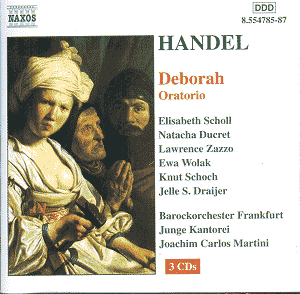Though described as an oratorio there is no difficulty
in recognising this is, in essence, very like an opera. Written for
London theatre audiences in 1733, it reflects the gradual replacement
of the sacred oratorio, as developed in Italy and France, by a new,
dramatic English form Ė a semi-staged work with a libretto derived from
biblical sources, in this case the fourth chapter of the Book of Judges.
Handel was clearly hoping to repeat the success of Rinaldo, his
first opera written for London, with a suitably Protestant religious
text. His librettist, Samuel Humphries, was a man of the theatre and
well understood the Italianate operatic style then popular all over
Europe. On his part Handel produced a well-upholstered score, making
use of substantial instrumental resources, including two harpsichords
and organ. Some idea of the haste with which Deborah was completed
can be inferred by the appearance of elements from earlier works, such
as the Chandos Anthems and Il trionfo del Tempo e del Disinganno.
Handel was not averse to borrowing from his own compositions, but never
sacrificed freshness and appropriateness. Hearing them in this context
is like meeting old friends in new clothes.
Deborah was launched with a hundred performers,
including 25 singers, at the Kingís Theatre in 1733, nine years before
Messiah. It tells how Deborah, prophetess and judge of Israel,
chooses Barak, son of Abinoam, to lead the people of Israel against
their oppressors, the Canaanites. In a vision, she sees the death of
Sisera, leader of the Canaanite army, at the hands of a woman. Jael
comes to Deborah seeking a retreat from such violence, but Deborah,
divinely inspired, sees him surrounded by angels and defended by the
Lord. Abinoam, Barakís father, hears the people rejoicing at the calling
of his son to lead the Israelites. A Herald is sent by Sisera with an
offer of parley, which is rejected. As the Israelite army awaits the
advance on Mount Tabor Sisera approaches, but is again dismissed. Barak
and Deborah foresee victory and, following a "grand military symphony",
this is achieved and the Israelites celebrate. Jael announces the death
of Sisera, whom he killed by driving a nail through her temple as she
slept in her tent. This rather unedifying plot is worked out in some
detail. The oratorio has three substantial parts, each divided into
a number of separate scenes.
Handelís music is, of course, full of fluent, tuneful
invention, with fine set pieces for both chorus and soloists; yet, compared
with his other sacred works, Deborah has its disappointments.
It is long, involved and benefits little from a text not conspicuous
for its poetic inspiration. In this live performance the occasional
"noises off" are not obtrusive and the orchestral playing
crisp and well focused. Unfortunately, in the vocal parts little can
be done to overcome a hollow acoustic that is totally unsympathetic
to the soloists, at times to an almost painful degree, and not improved
by a serious imbalance in the ensemble in several places. My overall
impression is one of insecurity and occasional insensitivity to the
heroic nature of the score. In spite of its historical interest, this
is therefore not a performance to be praised unreservedly, as can Handelís
Il Trionfo del Tempo e della Verita with Martini, the same chorus
and orchestra, Scholl and other soloists.
Roy D. Brewer


